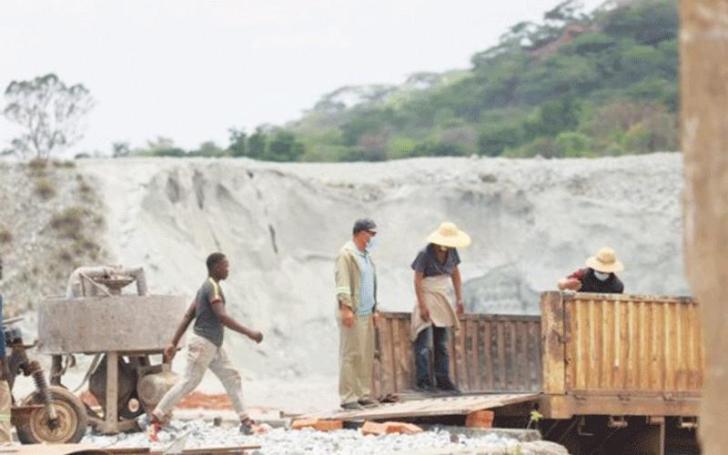Opinion / Columnist
Zimbabwe govt whips errant Chinese miners
04 Nov 2024 at 06:48hrs |
0 Views

The Zimbabwean government has intensified its efforts to combat environmental degradation linked to alluvial mining along the Sanyati River in Hurungwe, targeting two Chinese companies accused of illicit activities. The Environment Management Agency (EMA) recently imposed a ban on these companies, marking a significant step in addressing environmental concerns in the region.
The two companies, Riverlion (Pvt) Ltd and Baimei Investments, were found operating along the Sanyati River, which separates Hurungwe and Kariba rural districts, approximately 190 kilometers west of Karoi. Riverlion was engaged in riverbed mining, utilizing heavy machinery such as excavators and water pumps, while Baimei had begun land clearance for exploration purposes on the Kariba rural side.
EMA's Mashonaland West provincial spokesperson, Munyaradzi Nhariswa, confirmed that the agency acted upon a complaint regarding unauthorized mining operations along the river. "Indeed, two companies were identified: Riverlion (Pvt) Ltd situated on the Hurungwe side and Baimei Investments located on the Nyaminyami side," Nhariswa stated.
The agency found that Riverlion had excavated and modified the river channel, violating the Environmental Management Act [Cap 20:27] and Statutory Instrument 7 of 2007. Additionally, the company was penalized for using hazardous substances without the required licensing. Meanwhile, Baimei Investments was cited for conducting a prescribed project without the necessary Environmental Impact Assessment certificate.
Both companies have been served with environmental protection orders mandating an immediate halt to all mining activities and the relocation of their equipment at least 500 meters away from the river. They may only resume operations upon acquiring the requisite licenses.
Nhariswa emphasized the seriousness of the violations, stating, "Procedurally, mining is a prescribed project in terms of section 97 of the Environmental Management Act [Cap 20:27] and therefore requires the commissioning of an Environmental Impact Assessment report, which should be submitted to the agency for approval before commencement of any works." Violating these regulations could result in hefty fines or imprisonment.
In a related development, six officials—including four Chinese nationals—have been summoned to court over their illegal operations. This crackdown follows a research study by the Centre for Natural Resources Governance, titled Investments or Plunder? An Assessment of the Impacts of Chinese Investments in Zimbabwe's Extractive Sector, which highlighted severe environmental degradation and poor labor practices associated with Chinese mining activities in Zimbabwe.
Despite the increasing presence of Chinese firms in Zimbabwe, which stems from the country's Look East policy aimed at fostering economic ties, many of these companies have faced accusations of flouting local laws. Reports suggest that their employees often work under hazardous conditions, lacking proper safety gear, while concerns over tax evasion and the repatriation of profits to China continue to surface.
As the government enforces stricter regulations, the spotlight remains on ensuring that foreign investments adhere to environmental standards and contribute positively to Zimbabwe's socio-economic landscape.
The two companies, Riverlion (Pvt) Ltd and Baimei Investments, were found operating along the Sanyati River, which separates Hurungwe and Kariba rural districts, approximately 190 kilometers west of Karoi. Riverlion was engaged in riverbed mining, utilizing heavy machinery such as excavators and water pumps, while Baimei had begun land clearance for exploration purposes on the Kariba rural side.
EMA's Mashonaland West provincial spokesperson, Munyaradzi Nhariswa, confirmed that the agency acted upon a complaint regarding unauthorized mining operations along the river. "Indeed, two companies were identified: Riverlion (Pvt) Ltd situated on the Hurungwe side and Baimei Investments located on the Nyaminyami side," Nhariswa stated.
The agency found that Riverlion had excavated and modified the river channel, violating the Environmental Management Act [Cap 20:27] and Statutory Instrument 7 of 2007. Additionally, the company was penalized for using hazardous substances without the required licensing. Meanwhile, Baimei Investments was cited for conducting a prescribed project without the necessary Environmental Impact Assessment certificate.
Both companies have been served with environmental protection orders mandating an immediate halt to all mining activities and the relocation of their equipment at least 500 meters away from the river. They may only resume operations upon acquiring the requisite licenses.
Nhariswa emphasized the seriousness of the violations, stating, "Procedurally, mining is a prescribed project in terms of section 97 of the Environmental Management Act [Cap 20:27] and therefore requires the commissioning of an Environmental Impact Assessment report, which should be submitted to the agency for approval before commencement of any works." Violating these regulations could result in hefty fines or imprisonment.
In a related development, six officials—including four Chinese nationals—have been summoned to court over their illegal operations. This crackdown follows a research study by the Centre for Natural Resources Governance, titled Investments or Plunder? An Assessment of the Impacts of Chinese Investments in Zimbabwe's Extractive Sector, which highlighted severe environmental degradation and poor labor practices associated with Chinese mining activities in Zimbabwe.
Despite the increasing presence of Chinese firms in Zimbabwe, which stems from the country's Look East policy aimed at fostering economic ties, many of these companies have faced accusations of flouting local laws. Reports suggest that their employees often work under hazardous conditions, lacking proper safety gear, while concerns over tax evasion and the repatriation of profits to China continue to surface.
As the government enforces stricter regulations, the spotlight remains on ensuring that foreign investments adhere to environmental standards and contribute positively to Zimbabwe's socio-economic landscape.
Source - newsday
All articles and letters published on Bulawayo24 have been independently written by members of Bulawayo24's community. The views of users published on Bulawayo24 are therefore their own and do not necessarily represent the views of Bulawayo24. Bulawayo24 editors also reserve the right to edit or delete any and all comments received.
Join the discussion
Loading comments…































